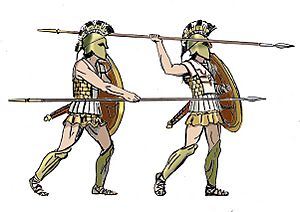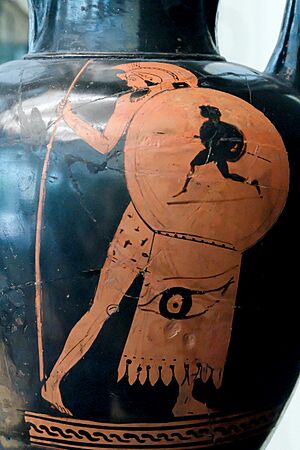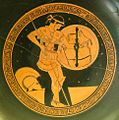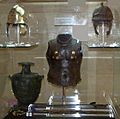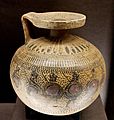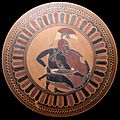Hoplite facts for kids
A hoplite was a special kind of soldier in Ancient Greek city-states. These soldiers were citizens, not professional fighters, who trained to protect their homes. Their main weapon was a long spear. They fought very close together in a formation called a phalanx formation. In this formation, each soldier's large shield protected himself and also partly covered the right arm of the soldier next to him.
The word "hoplite" actually comes from the name of their shield, which was called a hoplon. Later on, the word "hoplite" was sometimes used for any armored foot soldier, no matter what weapons they used or where they came from.
Contents
What Did a Hoplite Wear and Use?
Hoplites wore and carried several important pieces of equipment:
- helmet to protect their head and face
- A large, round shield (the hoplon)
- Body armor to protect their chest and back
- greaves, which were armor for their lower legs
- A sword for close-up fighting if their spear broke
- A long spear as their main weapon
Becoming a Soldier
Most hoplites were free citizens who had to buy their own armor and weapons. In many Greek city-states, citizens received basic military training. They were expected to join military campaigns whenever they were called upon.
The citizens of Lacedaemon (Sparta) were especially famous for their amazing military skills. They trained for combat their entire lives. In contrast, citizens of Athens were only excused from military service after they turned 60 years old.
Fighting in a Phalanx
The phalanx was a powerful fighting formation where soldiers worked as a team. It was usually at least eight rows deep. Each row had a leader, and an officer at the back helped keep everyone in order.
The soldiers in the front rows would stab at their enemies with their spears. They also tried to keep their position in the line. The rows behind them supported the front line. They pushed gently with their shields and spears, helping to keep the formation steady. At certain times, a command would be given to move forward a few steps.
In battle, a phalanx tended to slowly move to the right. This happened because each hoplite tried to stay safely behind the shield of the soldier next to him. The weakest part of a phalanx was its right side, where soldiers' right arms were not protected by shields. To help with this, the most experienced hoplites were often placed on the right side of the formation.
Images for kids
-
A probable Spartan hoplite from the Vix crater, around 500 BC.
-
Paintings of Ancient Macedonian soldiers, their weapons, and armor, from a tomb in Agios Athanasios, Thessaloniki, Greece, 4th century BC.
See also
 In Spanish: Hoplita para niños
In Spanish: Hoplita para niños
 | Bayard Rustin |
 | Jeannette Carter |
 | Jeremiah A. Brown |


